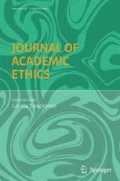Abstract
This paper examines the ethics review process for external researchers. Analysis of some ethical concerns and dilemmas experienced while conducting a multi-site study illustrates the complexities of researching in different contexts. Reflections on identity politics, and ethics review policies and practices expose the tensions between research ethics as a process, and development of ethical thinking and practice. The article concludes by articulating a new vision of ethics reviews for external researchers, which emphasise the need to develop long-term ethical thinking and actions.
Similar content being viewed by others
Notes
Māori are the indigenous people of Aotearoa New Zealand
Māori term for non- Māori New Zealanders
References
Casey, C. (2001). Ethics committees, institutions and organisations: Subjectivity consent and risk. In M. Tolich (Ed.), Research ethics in Aotearoa New Zealand: Concepts, practice, critique (pp. 127–140). Auckland: Pearson.
Clark, N., Hunt, S., Jules, G., & Good, T. (2010). Ethical dilemmas in community-based research: Working with vulnerable youth in rural communities. Journal of Academic Ethics, 8(4), 243–252. doi:10.1007/s10805-010-9123-y.
Fraser, N. (1995). From redistribution to recognition? dilemmas of justice in a “postsocialist” age. New Left Review, 212, 68–93.
Fraser, N. (2000). Rethinking recognition. New Left Review, 3, 107–120.
Fraser, N. (2007). Re-framing justice in a globalizing world. In T. Lovell (Ed.), (Mis)recognition, social inequality and social justice: Nancy Fraser and Pierre Bourdieu (pp. 17–35). London; New York: Routledge.
Fraser, N. (2008). Scales of justice: Reimagining political space in a globalizing world. Cambridge: Polity Press.
Halse, C., & Honey, A. (2005). Unraveling ethics: Illuminating the moral dilemmas of research ethics. Signs, 30(4), 2141–2162.
Jennings, S. (2012). Response to schrag: What are ethics committees for anyway? A defence of social science research ethics review. Research Ethics, 8(2), 87–96. doi:10.1177/1747016112445423.
Kelsey, J. (1997). The New Zealand experiment: A world model for structural adjustment? Auckland: Auckland University Press.
Lewis, M. (2008). New strategies of control: Academic freedom and research ethics boards. Qualitative Inquiry, 14(5), 684–699. doi:10.1177/1077800408314347.
Morrow, V., & Richards, M. (1996). The ethics of social research with children: An overview. Children & Society, 10(2), 90–105.
Mutch, C. (2006). On or off the record: Researching elites. In C. Mutch (Ed.), Challenging the notion of “other”: Reframing research in the Aotearoa New Zealand context (p. 9). Wellington: NZCER.
NZARE. (2010). NZARE ethical guidelines 2010. Wellington: NZARE. Retrieved from http://www.nzare.org.nz/policies-and-practices.aspx.
Powell, M., & Smith, A. (2006). Ethical guidelines for research with children: A review of current research ethics documentation in New Zealand. Kōtuitui: New Zealand Journal of Social Sciences Online, 1(2), 125–138. doi:10.1080/1177083X.2006.9522415.
Rivière, D. (2011). Looking from the outside/in: Re-thinking research ethics review. Journal of Academic Ethics, 9(3), 193–204. doi:10.1007/s10805-011-9139-y.
Roberts, P., & Codd, J. (2010). Neoliberal tertiary education policy. In M. Thrupp, & R. Irwin (Eds.), Another decade of New Zealand education policy: Where to now?
Small, R. (1998). Critical dialogue towards an unprincipled ethics of educational research. Australian Journal of Education, 42(1), 103–115. doi:10.1177/000494419804200107.
Smith, L. T. (1999). Decolonizing methodologies: Research and indigenous peoples. London: Zen books.
Sultana, F. (2007). Reflexivity, positionality and participatory ethics: Negotiating fieldwork dilemmas in international research. ACME: An International E-Journal for Critical Geographies, 6(3), 374–385.
Webber, M. (2008). Walking the space between: Identity and Māori/Pākehā. Wellington: NZCER Press.
Author information
Authors and Affiliations
Corresponding author
Rights and permissions
About this article
Cite this article
Tatebe, J. The Ethics of Difference: Ethical Dilemmas of External Researchers. J Acad Ethics 13, 229–237 (2015). https://doi.org/10.1007/s10805-015-9236-4
Published:
Issue Date:
DOI: https://doi.org/10.1007/s10805-015-9236-4




